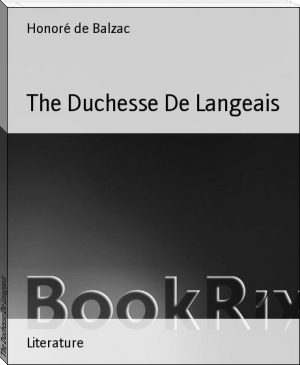The Thirteen by Honoré de Balzac (book club books .txt) 📖

- Author: Honoré de Balzac
Book online «The Thirteen by Honoré de Balzac (book club books .txt) 📖». Author Honoré de Balzac
The young man who called himself a friend of Henri de Marsay was a rattle-head who had come from the provinces, and whom the young men then in fashion were teaching the art of running through an inheritance; but he had one last leg to stand on in his province, in the shape of a secure establishment. He was simply an heir who had passed without any transition from his pittance of a hundred francs a month to the entire paternal fortune, and who, if he had not wit enough to perceive that he was laughed at, was sufficiently cautious to stop short at two-thirds of his capital. He had learned at Paris, for a consideration of some thousands of francs, the exact value of harness, the art of not being too respectful to his gloves, learned to make skilful meditations upon the right wages to give people, and to seek out what bargain was the best to close with them. He set store on his capacity to speak in good terms of his horses, of his Pyrenean hound; to tell by her dress, her walk, her shoes, to what class a woman belonged; to study _ecarte_, remember a few fashionable catchwords, and win by his sojourn in Parisian society the necessary authority to import later into his province a taste for tea and silver of an English fashion, and to obtain the right of despising everything around him for the rest of his days.
De Marsay had admitted him to his society in order to make use of him in the world, just as a bold speculator employs a confidential clerk. The friendship, real or feigned, of De Marsay was a social position for Paul de Manerville, who, on his side, thought himself astute in exploiting, after his fashion, his intimate friend. He lived in the reflecting lustre of his friend, walked constantly under his umbrella, wore his boots, gilded himself with his rays. When he posed in Henri's company or walked at his side, he had the air of saying: "Don't insult us, we are real dogs." He often permitted himself to remark fatuously: "If I were to ask Henri for such and such a thing, he is a good enough friend of mine to do it." But he was careful never to ask anything of him. He feared him, and his fear, although imperceptible, reacted upon the others, and was of use to De Marsay.
"De Marsay is a man of a thousand," said Paul. "Ah, you will see, he will be what he likes. I should not be surprised to find him one of these days Minister of Foreign Affairs. Nothing can withstand him."
He made of De Marsay what Corporal Trim made of his cap, a perpetual instance.
"Ask De Marsay and you will see!"
Or again:
"The other day we were hunting, De Marsay and I, He would not believe me, but I jumped a hedge without moving on my horse!"
Or again:
"We were with some women, De Marsay and I, and upon my word of honor, I was----" etc.
Thus Paul de Manerville could not be classed amongst the great, illustrious, and powerful family of fools who succeed. He would one day be a deputy. For the time he was not even a young man. His friend, De Marsay, defined him thus: "You ask me what is Paul? Paul? Why, Paul de Manerville!"
"I am surprised, my dear fellow," he said to De Marsay, "to see you here on a Sunday."
"I was going to ask you the same question."
"Is it an intrigue?"
"An intrigue."
"Bah!"
"I can mention it to you without compromising my passion. Besides, a woman who comes to the Tuileries on Sundays is of no account, aristocratically speaking."
"Ah! ah!"
"Hold your tongue then, or I shall tell you nothing. Your laugh is too loud, you will make people think that we have lunched too well. Last Thursday, here on the Terrasse des Feuillants, I was walking along, thinking of nothing at all, but when I got to the gate of the Rue de Castiglione, by which I intended to leave, I came face to face with a woman, or rather a young girl; who, if she did not throw herself at my head, stopped short, less I think, from human respect, than from one of those movements of profound surprise which affect the limbs, creep down the length of the spine, and cease only in the sole of the feet, to nail you to the ground. I have often produced effects of this nature, a sort of animal magnetism which becomes enormously powerful when the relations are reciprocally precise. But, my dear fellow, this was not stupefaction, nor was she a common girl. Morally speaking, her face seemed to say: 'What, is it you, my ideal! The creation of my thoughts, of my morning and evening dreams! What, are you there? Why this morning? Why not yesterday? Take me, I am thine, _et cetera_!' Good, I said to myself, another one! Then I scrutinize her. Ah, my dear fellow, speaking physically, my incognita is the most adorable feminine person whom I ever met. She belongs to that feminine variety which the Romans call _fulva, flava_--the woman of fire. And in chief, what struck me the most, what I am still taken with, are her two yellow eyes, like a tiger's, a golden yellow that gleams, living gold, gold which thinks, gold which loves, and is determined to take refuge in your pocket."
"My dear fellow, we are full of her!" cried Paul. "She comes here sometimes--_the girl with the golden eyes_! That is the name we have given her. She is a young creature--not more than twenty-two, and I have seen her here in the time of the Bourbons, but with a woman who was worth a hundred thousand of her."
"Silence, Paul! It is impossible for any woman to surpass this girl; she is like the cat who rubs herself against your legs; a white girl with ash-colored hair, delicate in appearance, but who must have downy threads on the third phalanx of her fingers, and all along her cheeks a white down whose line, luminous on fine days, begins at her ears and loses itself on her neck."
"Ah, the other, my dear De Marsay! She has black eyes which have never wept, but which burn; black eyebrows which meet and give her an air of hardness contradicted by the compact curve of her lips, on which the kisses do not stay, lips burning and fresh; a Moorish color that warms a man like the sun. But--upon my word of honor, she is like you!"
"You flatter her!"
"A firm figure, the tapering figure of a corvette built for speed, which rushes down upon the merchant vessel with French impetuosity, which grapples with her and sinks her at the same time."
"After all, my dear fellow," answered De Marsay, "what has that got to do with me, since I have never seen her? Ever since I have studied women, my incognita is the only one whose virginal bosom, whose ardent and voluptuous forms, have realized for me the only woman of my dreams--of my dreams! She is the original of that ravishing picture called _La Femme Caressant sa Chimere_, the warmest, the most infernal inspiration of the genius of antiquity; a holy poem prostituted by those who have copied it for frescoes and mosiacs; for a heap of bourgeois who see in this gem nothing more than a gew-gaw and hang it on their watch-chains--whereas, it is the whole woman, an abyss of pleasure into which one plunges and finds no end; whereas, it is the ideal woman, to be seen sometimes in reality in Spain or Italy, almost never in France. Well, I have again seen this girl of the gold eyes, this woman caressing her chimera. I saw her on Friday. I had a presentiment that on the following day she would be here at the same hour; I was not mistaken. I have taken a pleasure in following her without being observed, in studying her indolent walk, the walk of the woman without occupation, but in the movements of which one devines all the pleasure that lies asleep. Well, she turned back again, she saw me, once more she adored me, once more trembled, shivered. It was then I noticed the genuine Spanish duenna who looked after her, a hyena upon whom some jealous man has put a dress, a she-devil well paid, no doubt, to guard this delicious creature.... Ah, then the duenna made me deeper in love. I grew curious. On Saturday, nobody. And here I am to-day waiting for this girl whose chimera I am, asking nothing better than to pose as the monster in the fresco."
"There she is," said Paul. "Every one is turning round to look at her."
The unknown blushed, her eyes shone; she saw Henri, she shut them and passed by.
"You say that she notices you?" cried Paul, facetiously.
The duenna looked fixedly and attentively at the two young men. When the unknown and Henri passed each other again, the young girl touched him, and with her hand pressed the hand of the young man. Then she turned her head and smiled with passion, but the duenna led her away very quickly to the gate of the Rue de Castiglione.
The two friends followed the young girl, admiring the magnificent grace of the neck which met her head in a harmony of vigorous lines, and upon which a few coils of hair were tightly wound. The girl with the golden eyes had that well-knitted, arched, slender foot which presents so many attractions to the dainty imagination. Moreover, she was shod with elegance, and wore a short skirt. During her course she turned from time to time to look at Henri, and appeared to follow the old woman regretfully, seeming to be at once her mistress and her slave; she could break her with blows, but could not dismiss her. All that was perceptible. The two friends reached the gate. Two men in livery let down the step of a tasteful _coupe_ emblazoned with armorial bearings. The girl with the golden eyes was the first
 Have you ever thought about what fiction is? Probably, such a question may seem surprising: and so everything is clear. Every person throughout his life has to repeatedly create the works he needs for specific purposes - statements, autobiographies, dictations - using not gypsum or clay, not musical notes, not paints, but just a word. At the same time, almost every person will be very surprised if he is told that he thereby created a work of fiction, which is very different from visual art, music and sculpture making. However, everyone understands that a student's essay or dictation is fundamentally different from novels, short stories, news that are created by professional writers. In the works of professionals there is the most important difference - excogitation. But, oddly enough, in a school literature course, you don’t realize the full power of fiction. So using our website in your free time discover fiction for yourself.
Have you ever thought about what fiction is? Probably, such a question may seem surprising: and so everything is clear. Every person throughout his life has to repeatedly create the works he needs for specific purposes - statements, autobiographies, dictations - using not gypsum or clay, not musical notes, not paints, but just a word. At the same time, almost every person will be very surprised if he is told that he thereby created a work of fiction, which is very different from visual art, music and sculpture making. However, everyone understands that a student's essay or dictation is fundamentally different from novels, short stories, news that are created by professional writers. In the works of professionals there is the most important difference - excogitation. But, oddly enough, in a school literature course, you don’t realize the full power of fiction. So using our website in your free time discover fiction for yourself. 




Comments (0)